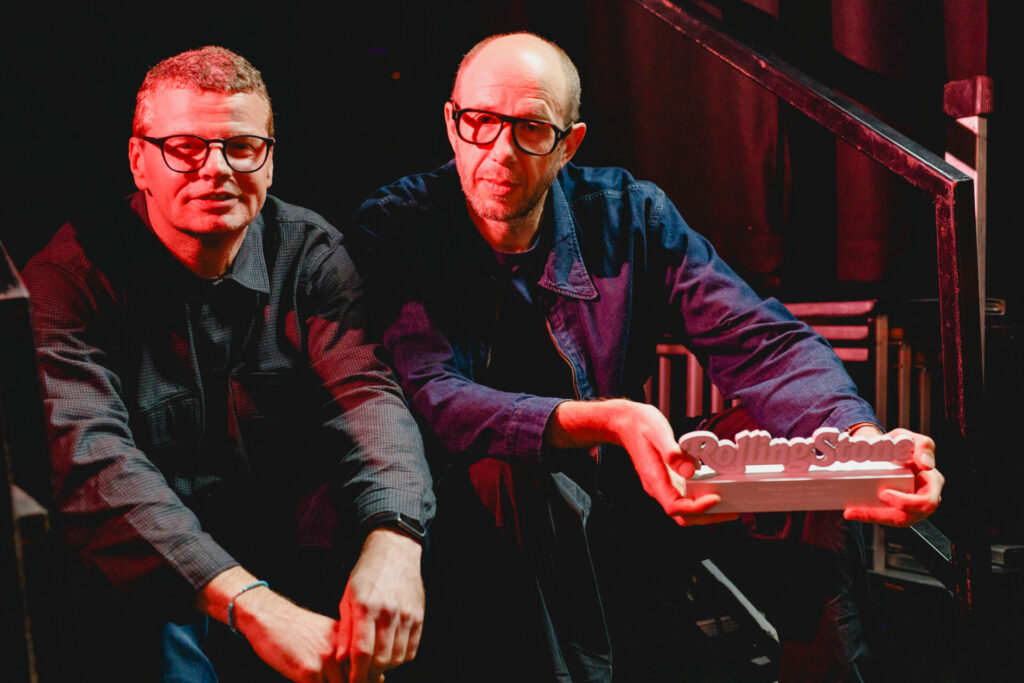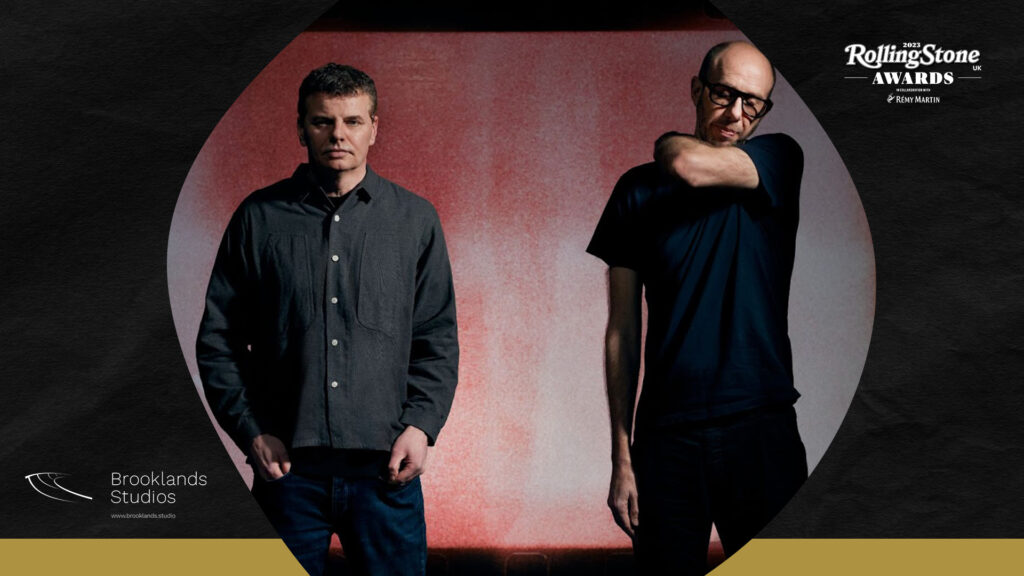For That Beautiful Feeling: How The Chemical Brothers delivered our album of the year
As Ed Simons and Tom Rowlands approach their 35th anniversary as The Chemical Brothers, the pioneering electronic duo discuss their tenth record - which has won the Album Award at the Rolling Stone UK Awards in collaboration with Remy Martin
By Ben Jolley

The Chemical Brothers — aka Manchester-based electronic pioneers Ed Simons and Tom Rowlands — had a clear vision in mind when they started work on their tenth album, For That Beautiful Feeling, the winner of The Album Award, supported by Brooklands Studio. “We really wanted to embrace the idea of speaking very directly through music, because sometimes it’s obscured quite a lot and scared of a big emotion,” says Rowlands, as he and Simons speak toRolling Stone UK backstage before their Birmingham Arena show.
Having said that, the pair didn’t consciously intend to channel a particular set of ideas. Instead, they came naturally because of the time in which the record was made — during the first Covid-19 lockdown. Simons describes that period as “a strange time”. “Whether it was the fear that came up, the pause in people’s lives, or the loss, it’s in there somewhere,” he says of the songs that resulted from it.
Although the pair didn’t set out to reflect that period in their music, a variety of emotions runs through many of the album’s tracks. While Simons recognises that everyone had vastly different experiences of lockdown, there was one shared feeling: “missing the flow of life”. He thinks that “coming back into a relationship with your life and with other people as it was” is something that people are still getting to grips with, even now. While this isn’t a concept, he says that denying such influences, albeit subconscious ones, would be “strange and soulless”.
Simons continues: “When we’re playing some of these songs live, like April 2021’s ‘The Darkness That You Fear’, which was released during that very strange time, you can feel in the air that it’s hitting into something that is still being processed.”
Another observation that came from playing live is the cohesion between their new album and 2019’s No Geography. “Quite often, the album you make is a strong reaction to the last one,” says Rowlands. “Sometimes, there’s a real opposition to what you’ve just done, but this felt more like a continuation. The two albums seem to fit together quite well.”

Despite creating the songs at a time when venues and clubs were shut, the pair were thinking about performing live when they were making the tracks. “That’s the mind’s-eye picture you have sometimes,” says Rowlands, “a field of people responding to the music and the quality of it, the emotional tone, the sounds. It’s an important part.” Perhaps for this reason, the album veers between moments of introspection and catharsis. Whichever direction it’s pulling in, however, there is a common thread at its core: “Some is very much about the shared experience of a good beat or a good sound, and what it can do to people,” says Rowlands.
He describes the process of making music as being like a puzzle. “It’s a maze,” he begins. “You go down lots of different avenues and get lost, and you think it’s the wrong way and you come back and it’s all…”
Simons chimes in to succinctly clarify: “You retrace your steps.”
Rowlands takes up the thread once more: “It’s when you look at demo 512, from 2 March 2021, and think: ‘Maybe there was something in that.’”
Rowlands and Simons have always worked by piecing everything together. “Often, the concept is found after you make the album,” says Rowlands. “It’s more a case of what was coming out of us. It’s always a response to how you feel when you come into the studio — maybe it’s a subconscious feeling that you want to express something, or maybe it was a time when you felt like you wanted to say something that moved you in some way.”
They also enjoy the external stimulus that comes from collaborating with other artists. One of the most euphoric and uplifting tracks on the record is ‘Skipping Like a Stone’, which features Beck, who the pair both admire.
Simons recalls that working with him was “a real pleasure — to be able to send him a song we’re working on, and together, we can figure out where it goes.”
The original demo had been floating around for some time but, as Rowlands says, “It didn’t feel complete until we heard him sing on it. There was always a good idea, but he took it somewhere beyond,” he explains, adding that this is “the brilliance of collaboration”. “You imagine it to a certain point, and then someone else of his talent and incredible voice and vision says: ‘It can go here as well.’”
The pair’s decision to work with French vocalist Halo Maud was the result of a similar situation. “There were lots of songs that had very rough vocal ideas, but we were trying to find a voice that could sing them and really get to the heart of what we were chasing,” Rowlands reflects.
Having heard her record, they were impressed by her voice and decided that she would be a good fit. The first song the pair sent her was ‘Live Again’, so that she could re-sing the demo. Having sent the tracks back and forward over email, Rowlands describes the collaboration as “a really easy, beautiful process”. “We had a very clear idea of what we wanted to do, and she totally got it. Immediately, we felt hers was the voice that we wanted to communicate these things. Hearing her interpretation, it just felt like, ‘Oh, this is the record now.’”
Because Rowlands and Simons wanted the album to have a circular feel to it, Maud’s voice is present on both the introduction and the closing title track. The pair say that it was important to have her start it and then loop it back around to the beginning as a way of bringing it to a close. “That was an idea that we hit upon when we were putting the album together — that it would be this sort of circular thing. At the point of starting, the voices would be broken and wrong. And the journey loops back around to piece it together, in a way, so it was brilliant to have her voice flowing through the whole album,” says Rowlands.
He adds that their process of making albums is “often quite long”. He and Simons work on a record “until we get to a point where we listen to it all and feel moved by it and feel that it communicates something and expresses something that is within us,” he says.
Simons suggests that there is an “unknowable knowing” about when a record is complete. “Knowing when an album is an album and not just a collection of tracks or a recording of a passage of time… It’s when you put things together and there’s a flow,” he suggests.
Rowlands sums it up: “It’s a feeling,” he says. But, as has always been the case, rather than wanting to elicit a specific emotion, Rowlands and Simons are happy as long as people feel something when listening to the new album. “We cannot control meaning,” Rowlands says, “but often after finishing an album, you think, ‘Everything that was in us is now out of us.’”
Although they didn’t consciously aim to link the new album to their past discography, a progression is evident. “We never forget them,” Rowlands says of their earlier albums. “Hopefully, listening to the first one, you can understand how we ended up with the 10th one.” He expands: “We never think: ‘Ground zero: we’ve done this and disown The Chemical Brothers sound’ or what we like about music. But hopefully there’s a common thread of two souls creating something together that’s kind of consistent. And within that, there’s a lot of broad musical expressions. But there’s something at the heart of it that ties them all together.”
Similarly, when it comes to their spectacular live shows, songs from different eras are paired effortlessly. “I love it when we play live because we mix together things we literally made 30 years ago with something we’ve just made. I love the way there’s a cohesion between it all, and everything joins together,” says Rowlands. “Considering there isn’t a lead vocalist or lead guitarist that gives a band its very identifiable signature, we’ve somehow managed to make this music that still feels really connected. I think, with our take on music, we’ve made our own little kind of world.”
